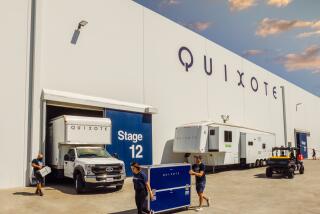Kodak in Deal to Boost Digital Presence
- Share via
Expanding its push into a high-tech Hollywood, film giant Eastman Kodak Co. said it would pay $30.5 million for Laser-Pacific Media Corp., a Los Angeles-based digital post-production company.
The deal -- which calls for Kodak to pay $4.22 a share in stock or cash, a 37% premium over Laser-Pacific’s closing price Thursday -- is expected to close by year’s end.
The acquisition would be a small but strategically important one for Rochester, N.Y.-based Kodak, which had $12.8 billion in sales last year. The merger would represent the latest in a series of aggressive moves to protect the market it built with photo chemicals.
Sales in Kodak’s traditional consumer film and paper businesses have been steadily falling as the public flocks to digital cameras, which let users record snapshots on a computer chip and send them over the Internet. Looking to bolster its bottom line, Kodak has concentrated on expanding two key areas: medical imaging and entertainment.
Last month, the company announced it would spend about $500 million to buy PracticeWorks Inc., an Atlanta-based medical software firm.
In Hollywood, Kodak began its digital hedge more than a decade ago. Its Cinesite facility in Los Angeles has handled such processes as digital imaging, in which film is digitally manipulated, and digital intermediate mastering, or converting film to digital and back again.
By adding Laser-Pacific, which does similar work for film and television producers, Kodak hopes to expand its presence.
Founded in 1990 and based in Hollywood, Laser-Pacific has earned a reputation as a hot technology company that specialized in television. As the years passed and the company earned numerous engineering and technical awards, Laser-Pacific expanded into film projects.
“The deal partners us with deep financial resources that allow us to expand what we do,” said James R. Parks, chief executive of Laser-Pacific.
Yet the acquisition also would place Kodak in direct competition with some of its biggest customers: Technicolor Inc. of Camarillo, a film lab owned by Thomson, and Deluxe Film Laboratories Inc. of Los Angeles.
“One of the biggest challenges is establishing that balance with our customers,” said Eric Rodli, president of Kodak’s entertainment imaging unit in Los Angeles, which would oversee Laser-Pacific once the deal is complete.
The film labs also are investors in digital post-production facilities that are firmly entrenched in the market that Cinesite is going after: Technicolor owns the Technique facility in Burbank, and Deluxe controls 20% of E-Film in Hollywood.
Officials from Technicolor and Deluxe couldn’t be reached for comment Friday.
Laser-Pacific had net income of $1.2 million in 2002, compared with $2.6 million a year earlier. Revenue last year was $31.8 million, compared with $33.6 million in 2001. The company’s earnings performance has brightened this year, with first-quarter net income increasing 67% to $655,733 and revenue jumping 23% to $9.8 million.
Kodak and Hollywood have been intimate partners for more than a century. In every camera, in every editing bay and in every projection booth, Kodak has been there.
This year, Kodak’s entertainment group is expected to pull in sales of nearly $1.1 billion, or about 8% of Kodak’s overall revenue, said Craig A. Ellis, vice president of equity research for Smith Barney.
Nevertheless, digital technologies are eating into celluloid’s dominance in Hollywood. On television and movie sets, the shift to digital equipment is beginning. Inside editing rooms and visual-effects houses, the transition is complete. And the push to overhaul movie theaters with digital projectors is coming.
Given this change, it’s essential for companies in the film business to make a move into the digital market for the long term, “or there will be no long term,” said Michael Katz, a senior vice president with Booz Allen Hamilton Inc. who co-wrote a report on digital cinema.
“If you’re betting the whole business on digital, you’re going to be the one jumping in earlier rather than later,” Katz said.
Some analysts are optimistic that the conversion will be slow enough for Kodak to make the shift.
“Digital encroachment appears as much of a near-term opportunity as a near-term threat,” Ellis wrote in a report Friday. “Digital penetration is in the very early stages, and in our view will come quite slowly as standards development always seems to take longer than expected.”
Kodak shares Friday fell 8 cents to $27.55 on the New York Stock Exchange, while Laser-Pacific rose $1 to $4.09 on Nasdaq.
More to Read
Inside the business of entertainment
The Wide Shot brings you news, analysis and insights on everything from streaming wars to production — and what it all means for the future.
You may occasionally receive promotional content from the Los Angeles Times.










